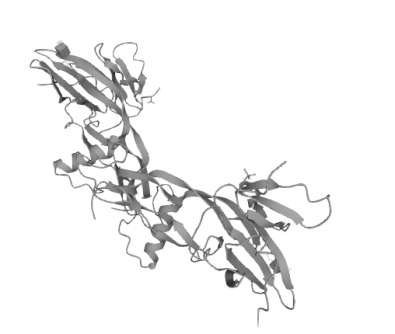Service Line:+86-022-82164980
Address:FL-4, Building A5, International Enterprise Community, Tianjin, China
Email:[email protected]
Sex hormone markers include Anti-Müllerian hormone (AMH), human chorionic gonadotropin (HCG), luteinizing hormone (LH), follicle stimulating hormone (FSH), and blood prolactin (PRL). Anti-Müllerian hormone (AMH) is a member of the transforming growth factor beta (TGF-β) family and is a dimeric glycoprotein produced by granulosa cells in ovarian follicles, which play an important role in the process of fetal sexual differentiation, where it promotes the degeneration of the Müllerian ducts during the process of fetal differentiation into males, and during the process of differentiation into females. Inhibits the recruitment of primordial follicles and the development of sinus follicles in females, effectively prevents premature follicular depletion, and is the most accurate biomarker of ovarian aging.
KMD Bioscience successfully develops AMH antigen antibody diagnostic raw materials by utilizing its own empirical knowledge of the structure-function of antibodies and proteins, combined with proven bioinformatics prediction capabilities. Currently, KMD Bioscience's antibody platform includes four major platforms: monoclonal antibody production platform, polyclonal antibody production platform, phage antibody library technology platform, and antibody sequencing and application platform. All antibodies provided by KMD Bioscience are subject to stringent testing to ensure their purity and sensitivity for use in a variety of diagnostic platforms, such as LFIA, ELISA, CLIA, POCT, and so on.
The inventory of reagents associated with the sex hormone marker Anti-Müllerian Hormone (AMH) that KMD Bioscience can offer:
|
CAT# |
Product Name |
Species |
Host |
Application |
Size |
Inquiry |
|
PA235 |
Human |
Mouse |
LFIA (Lateral-Flow Immunochromatographic Assay), CLIA (Chemiluminescence Immunoassay), ELISA |
1mg |
Inquiry |
|
|
PA236 |
Human |
Mouse |
LFIA (Lateral-Flow Immunochromatographic Assay), CLIA (Chemiluminescence Immunoassay), ELISA |
1mg |
Inquiry |
|
|
SMAG3261 |
Human |
HEK293 |
LFIA (Lateral-Flow Immunochromatographic Assay), CLIA (Chemiluminescence Immunoassay), ELISA |
1mg |
Inquiry |
|
|
KMP3421 |
Human |
HEK293 Cells |
|
50ug, 100ug |
Inquiry |
Molecular Structure and Characterization of AMH
Anti-Müllerian Hormone (AMH) is similar to other TGF-β superfamily members in that it is a dimeric glycoprotein consisting of two identical glycoproteins covalently linked by three disulfide bonds. Each monomer consists of 560 amino acids and each monomer contains an N-terminal ("pro" region), a C-terminal ("mature" region), and a middle ("mid" region). region). In the peripheral circulation, AMH exists in two forms. One is the proAMH homodimer, which does not bind to the AMH receptor. The other is a truncated form of AMH, which is the AMH2-type receptor-bound form, i.e., AMHN,C. The 140 KDa proAMH homodimer undergoes truncation by proteases, producing a 25 KDa C-terminal dimer (AMHC) and a 120 KDa N-terminal dimer (AMHN), which are still bound together by a non-covalent cross-link. These two terminal forms are still bound together in a non-covalent crosslinked form.

Figure 1 Schematic diagram of the molecular structure of AMH
Biological significance of AMH
Anti-Müllerian hormone (AMH) plays an important role at every stage of human development. In embryonic development, AMH regulates the differentiation and development of the reproductive tract and plays a decisive role in sex differentiation; after the birth of the fetus, AMH regulates the function of testicular mesenchymal stromal cells in males; and in adult females, it inhibits primordial follicle recruitment and sinus follicle development to avoid premature follicle depletion, so AMH is considered to be the most reliable biomarker for the assessment of the ovarian reserve function at present.
KMD Bioscience independently develops and produces anti-mullerian hormone products, by immunizing mice with AMH antigen to obtain mouse anti-human AMH monoclonal antibody (detection) and (capture), with high specificity and small batch-to-batch variations, which supports researchers to carry out the activity research of AMH protein targets and protein interaction research. And it can be applied to lateral flow immunochromatographic assay (LFIA), chemiluminescent immunoassay (CLIA) and enzyme-linked immunosorbent assay (ELISA). KMD Bioscience offers a diverse range of protein products, including recombinant proteins, viral proteins and bacterial proteins, etc. All the protein products provided have undergone rigorous QC validation and are characterized by low endotoxin content and high purity. With an experienced R&D team and mature quality management system, the platform can provide customized services according to customers' R&D needs, from gene sequence design, protein expression host selection, to monoclonal antibody production in every R&D process, to meet the needs of diagnostic raw material development, scientific research and other different applications.